Enterprise Agreement Analysis: Fair Work Commission & Termination
VerifiedAdded on 2023/06/04
|6
|1449
|101
Report
AI Summary
This report provides an analysis of enterprise agreements, focusing on the circumstances under which an agreement can be terminated, particularly by the Fair Work Commission in Australia. It examines various industrial relations factors that can lead to termination, including unfair dismissal, violation of general protections, bullying, employee misconduct, incapacity, and poor performance. The report also discusses genuine redundancy as a valid reason for termination, emphasizing the importance of due process and providing evidence to support the employer's actions. It highlights the significance of clear company policies, performance management procedures, and the potential impact of technological advancements and changes in company objectives. The analysis considers the industrial relations context, including collective bargaining, and references a Domino's Pizza Enterprise Agreement as a case study. The report underscores the importance of understanding and interpreting enterprise agreements for industrial relations practitioners, managers, and employees.
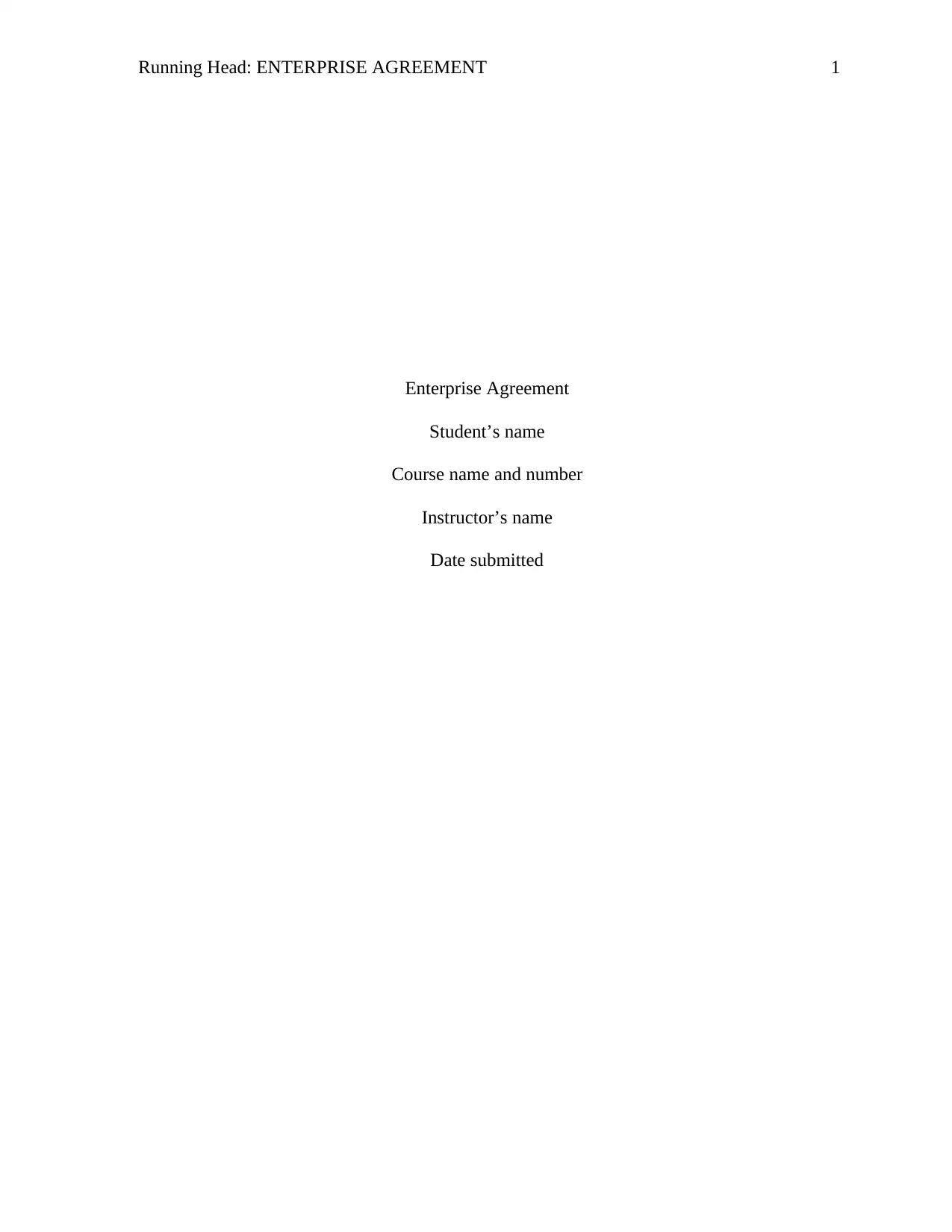
Running Head: ENTERPRISE AGREEMENT 1
Enterprise Agreement
Student’s name
Course name and number
Instructor’s name
Date submitted
Enterprise Agreement
Student’s name
Course name and number
Instructor’s name
Date submitted
Paraphrase This Document
Need a fresh take? Get an instant paraphrase of this document with our AI Paraphraser
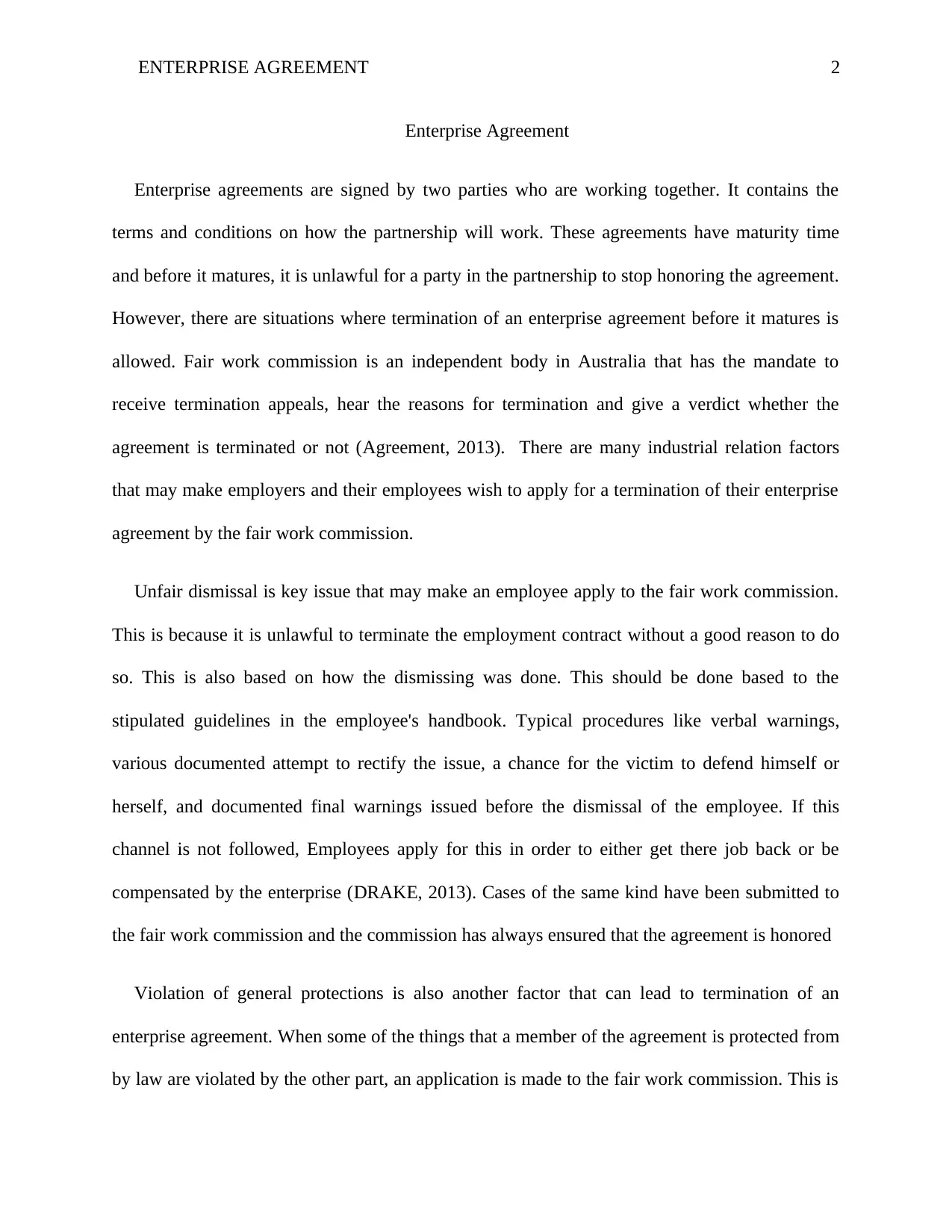
ENTERPRISE AGREEMENT 2
Enterprise Agreement
Enterprise agreements are signed by two parties who are working together. It contains the
terms and conditions on how the partnership will work. These agreements have maturity time
and before it matures, it is unlawful for a party in the partnership to stop honoring the agreement.
However, there are situations where termination of an enterprise agreement before it matures is
allowed. Fair work commission is an independent body in Australia that has the mandate to
receive termination appeals, hear the reasons for termination and give a verdict whether the
agreement is terminated or not (Agreement, 2013). There are many industrial relation factors
that may make employers and their employees wish to apply for a termination of their enterprise
agreement by the fair work commission.
Unfair dismissal is key issue that may make an employee apply to the fair work commission.
This is because it is unlawful to terminate the employment contract without a good reason to do
so. This is also based on how the dismissing was done. This should be done based to the
stipulated guidelines in the employee's handbook. Typical procedures like verbal warnings,
various documented attempt to rectify the issue, a chance for the victim to defend himself or
herself, and documented final warnings issued before the dismissal of the employee. If this
channel is not followed, Employees apply for this in order to either get there job back or be
compensated by the enterprise (DRAKE, 2013). Cases of the same kind have been submitted to
the fair work commission and the commission has always ensured that the agreement is honored
Violation of general protections is also another factor that can lead to termination of an
enterprise agreement. When some of the things that a member of the agreement is protected from
by law are violated by the other part, an application is made to the fair work commission. This is
Enterprise Agreement
Enterprise agreements are signed by two parties who are working together. It contains the
terms and conditions on how the partnership will work. These agreements have maturity time
and before it matures, it is unlawful for a party in the partnership to stop honoring the agreement.
However, there are situations where termination of an enterprise agreement before it matures is
allowed. Fair work commission is an independent body in Australia that has the mandate to
receive termination appeals, hear the reasons for termination and give a verdict whether the
agreement is terminated or not (Agreement, 2013). There are many industrial relation factors
that may make employers and their employees wish to apply for a termination of their enterprise
agreement by the fair work commission.
Unfair dismissal is key issue that may make an employee apply to the fair work commission.
This is because it is unlawful to terminate the employment contract without a good reason to do
so. This is also based on how the dismissing was done. This should be done based to the
stipulated guidelines in the employee's handbook. Typical procedures like verbal warnings,
various documented attempt to rectify the issue, a chance for the victim to defend himself or
herself, and documented final warnings issued before the dismissal of the employee. If this
channel is not followed, Employees apply for this in order to either get there job back or be
compensated by the enterprise (DRAKE, 2013). Cases of the same kind have been submitted to
the fair work commission and the commission has always ensured that the agreement is honored
Violation of general protections is also another factor that can lead to termination of an
enterprise agreement. When some of the things that a member of the agreement is protected from
by law are violated by the other part, an application is made to the fair work commission. This is
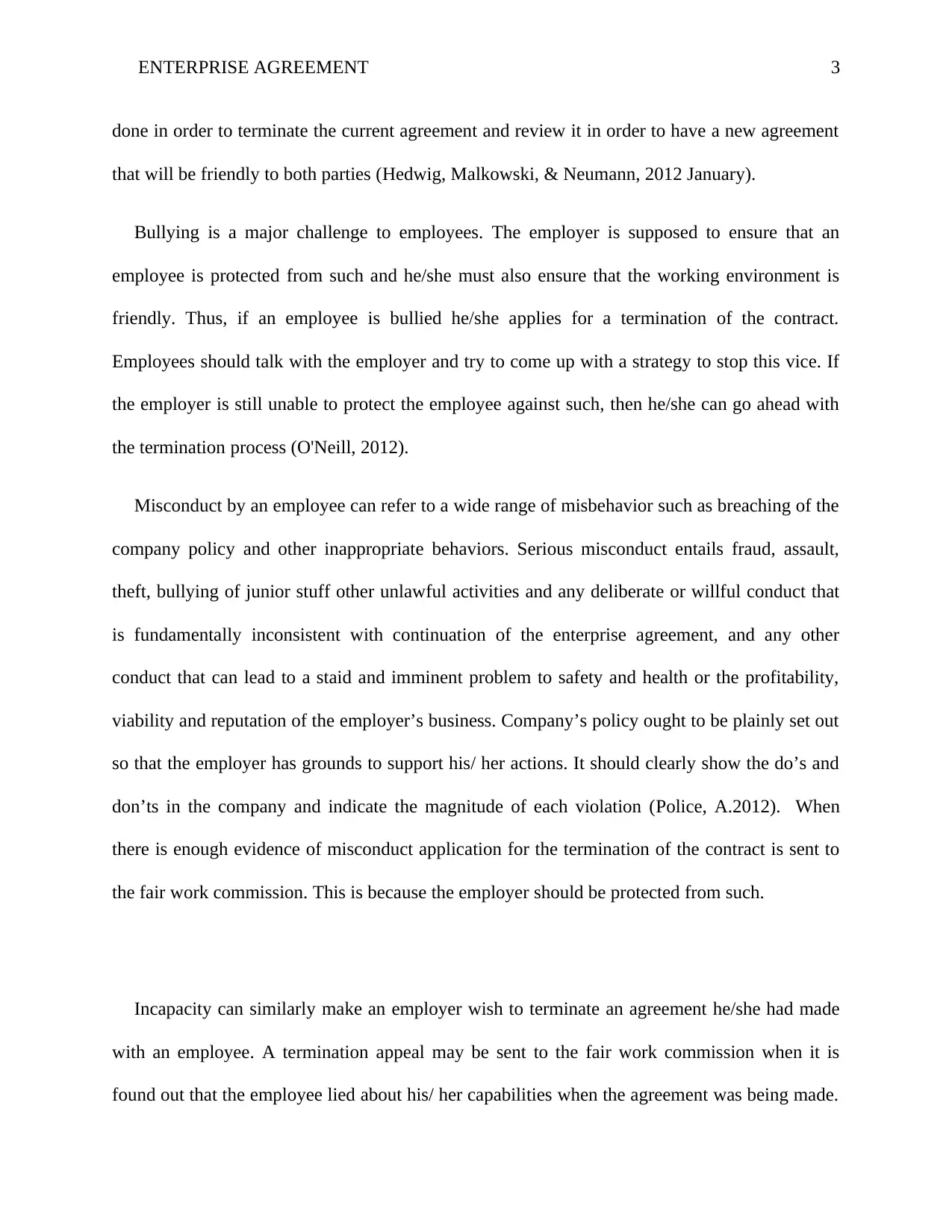
ENTERPRISE AGREEMENT 3
done in order to terminate the current agreement and review it in order to have a new agreement
that will be friendly to both parties (Hedwig, Malkowski, & Neumann, 2012 January).
Bullying is a major challenge to employees. The employer is supposed to ensure that an
employee is protected from such and he/she must also ensure that the working environment is
friendly. Thus, if an employee is bullied he/she applies for a termination of the contract.
Employees should talk with the employer and try to come up with a strategy to stop this vice. If
the employer is still unable to protect the employee against such, then he/she can go ahead with
the termination process (O'Neill, 2012).
Misconduct by an employee can refer to a wide range of misbehavior such as breaching of the
company policy and other inappropriate behaviors. Serious misconduct entails fraud, assault,
theft, bullying of junior stuff other unlawful activities and any deliberate or willful conduct that
is fundamentally inconsistent with continuation of the enterprise agreement, and any other
conduct that can lead to a staid and imminent problem to safety and health or the profitability,
viability and reputation of the employer’s business. Company’s policy ought to be plainly set out
so that the employer has grounds to support his/ her actions. It should clearly show the do’s and
don’ts in the company and indicate the magnitude of each violation (Police, A.2012). When
there is enough evidence of misconduct application for the termination of the contract is sent to
the fair work commission. This is because the employer should be protected from such.
Incapacity can similarly make an employer wish to terminate an agreement he/she had made
with an employee. A termination appeal may be sent to the fair work commission when it is
found out that the employee lied about his/ her capabilities when the agreement was being made.
done in order to terminate the current agreement and review it in order to have a new agreement
that will be friendly to both parties (Hedwig, Malkowski, & Neumann, 2012 January).
Bullying is a major challenge to employees. The employer is supposed to ensure that an
employee is protected from such and he/she must also ensure that the working environment is
friendly. Thus, if an employee is bullied he/she applies for a termination of the contract.
Employees should talk with the employer and try to come up with a strategy to stop this vice. If
the employer is still unable to protect the employee against such, then he/she can go ahead with
the termination process (O'Neill, 2012).
Misconduct by an employee can refer to a wide range of misbehavior such as breaching of the
company policy and other inappropriate behaviors. Serious misconduct entails fraud, assault,
theft, bullying of junior stuff other unlawful activities and any deliberate or willful conduct that
is fundamentally inconsistent with continuation of the enterprise agreement, and any other
conduct that can lead to a staid and imminent problem to safety and health or the profitability,
viability and reputation of the employer’s business. Company’s policy ought to be plainly set out
so that the employer has grounds to support his/ her actions. It should clearly show the do’s and
don’ts in the company and indicate the magnitude of each violation (Police, A.2012). When
there is enough evidence of misconduct application for the termination of the contract is sent to
the fair work commission. This is because the employer should be protected from such.
Incapacity can similarly make an employer wish to terminate an agreement he/she had made
with an employee. A termination appeal may be sent to the fair work commission when it is
found out that the employee lied about his/ her capabilities when the agreement was being made.
⊘ This is a preview!⊘
Do you want full access?
Subscribe today to unlock all pages.

Trusted by 1+ million students worldwide
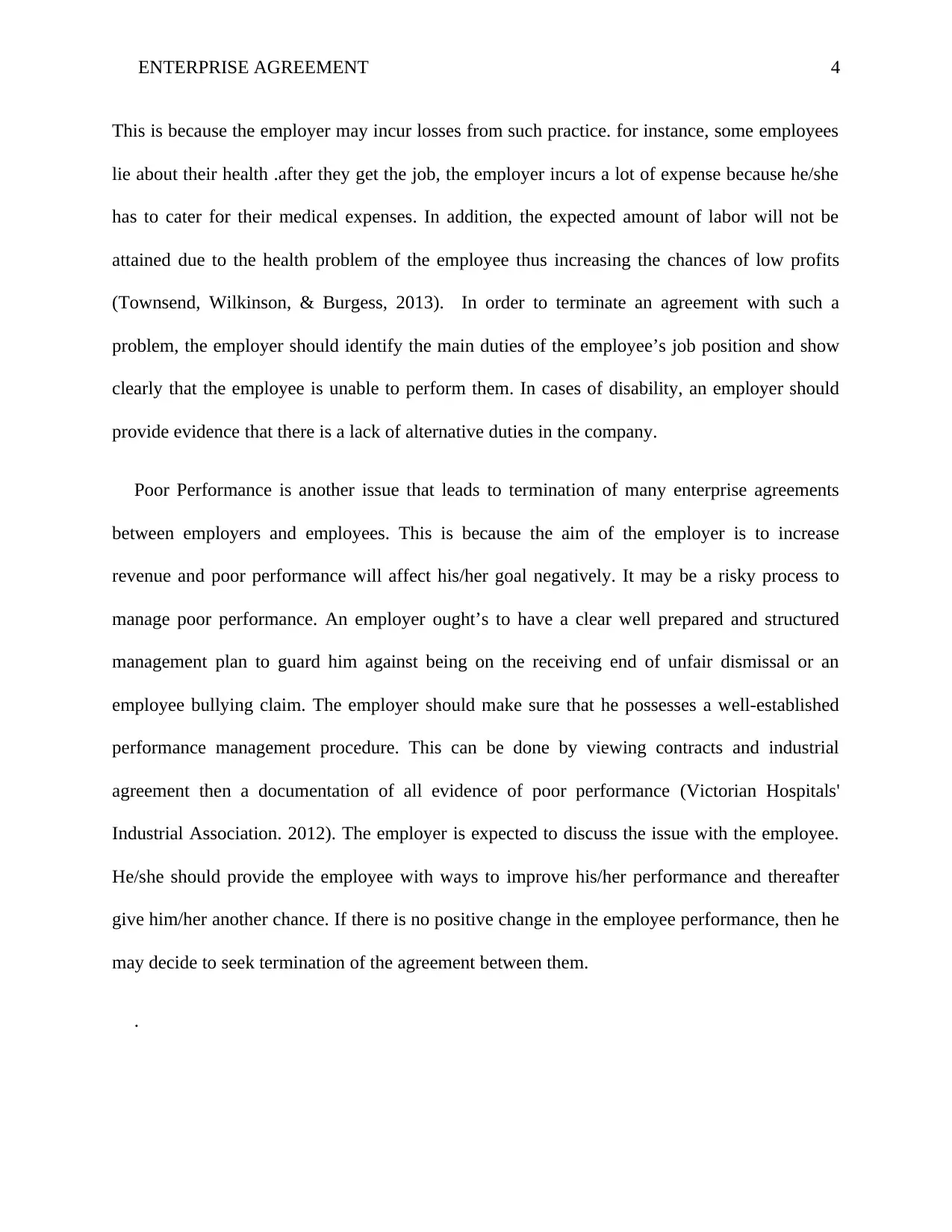
ENTERPRISE AGREEMENT 4
This is because the employer may incur losses from such practice. for instance, some employees
lie about their health .after they get the job, the employer incurs a lot of expense because he/she
has to cater for their medical expenses. In addition, the expected amount of labor will not be
attained due to the health problem of the employee thus increasing the chances of low profits
(Townsend, Wilkinson, & Burgess, 2013). In order to terminate an agreement with such a
problem, the employer should identify the main duties of the employee’s job position and show
clearly that the employee is unable to perform them. In cases of disability, an employer should
provide evidence that there is a lack of alternative duties in the company.
Poor Performance is another issue that leads to termination of many enterprise agreements
between employers and employees. This is because the aim of the employer is to increase
revenue and poor performance will affect his/her goal negatively. It may be a risky process to
manage poor performance. An employer ought’s to have a clear well prepared and structured
management plan to guard him against being on the receiving end of unfair dismissal or an
employee bullying claim. The employer should make sure that he possesses a well-established
performance management procedure. This can be done by viewing contracts and industrial
agreement then a documentation of all evidence of poor performance (Victorian Hospitals'
Industrial Association. 2012). The employer is expected to discuss the issue with the employee.
He/she should provide the employee with ways to improve his/her performance and thereafter
give him/her another chance. If there is no positive change in the employee performance, then he
may decide to seek termination of the agreement between them.
.
This is because the employer may incur losses from such practice. for instance, some employees
lie about their health .after they get the job, the employer incurs a lot of expense because he/she
has to cater for their medical expenses. In addition, the expected amount of labor will not be
attained due to the health problem of the employee thus increasing the chances of low profits
(Townsend, Wilkinson, & Burgess, 2013). In order to terminate an agreement with such a
problem, the employer should identify the main duties of the employee’s job position and show
clearly that the employee is unable to perform them. In cases of disability, an employer should
provide evidence that there is a lack of alternative duties in the company.
Poor Performance is another issue that leads to termination of many enterprise agreements
between employers and employees. This is because the aim of the employer is to increase
revenue and poor performance will affect his/her goal negatively. It may be a risky process to
manage poor performance. An employer ought’s to have a clear well prepared and structured
management plan to guard him against being on the receiving end of unfair dismissal or an
employee bullying claim. The employer should make sure that he possesses a well-established
performance management procedure. This can be done by viewing contracts and industrial
agreement then a documentation of all evidence of poor performance (Victorian Hospitals'
Industrial Association. 2012). The employer is expected to discuss the issue with the employee.
He/she should provide the employee with ways to improve his/her performance and thereafter
give him/her another chance. If there is no positive change in the employee performance, then he
may decide to seek termination of the agreement between them.
.
Paraphrase This Document
Need a fresh take? Get an instant paraphrase of this document with our AI Paraphraser
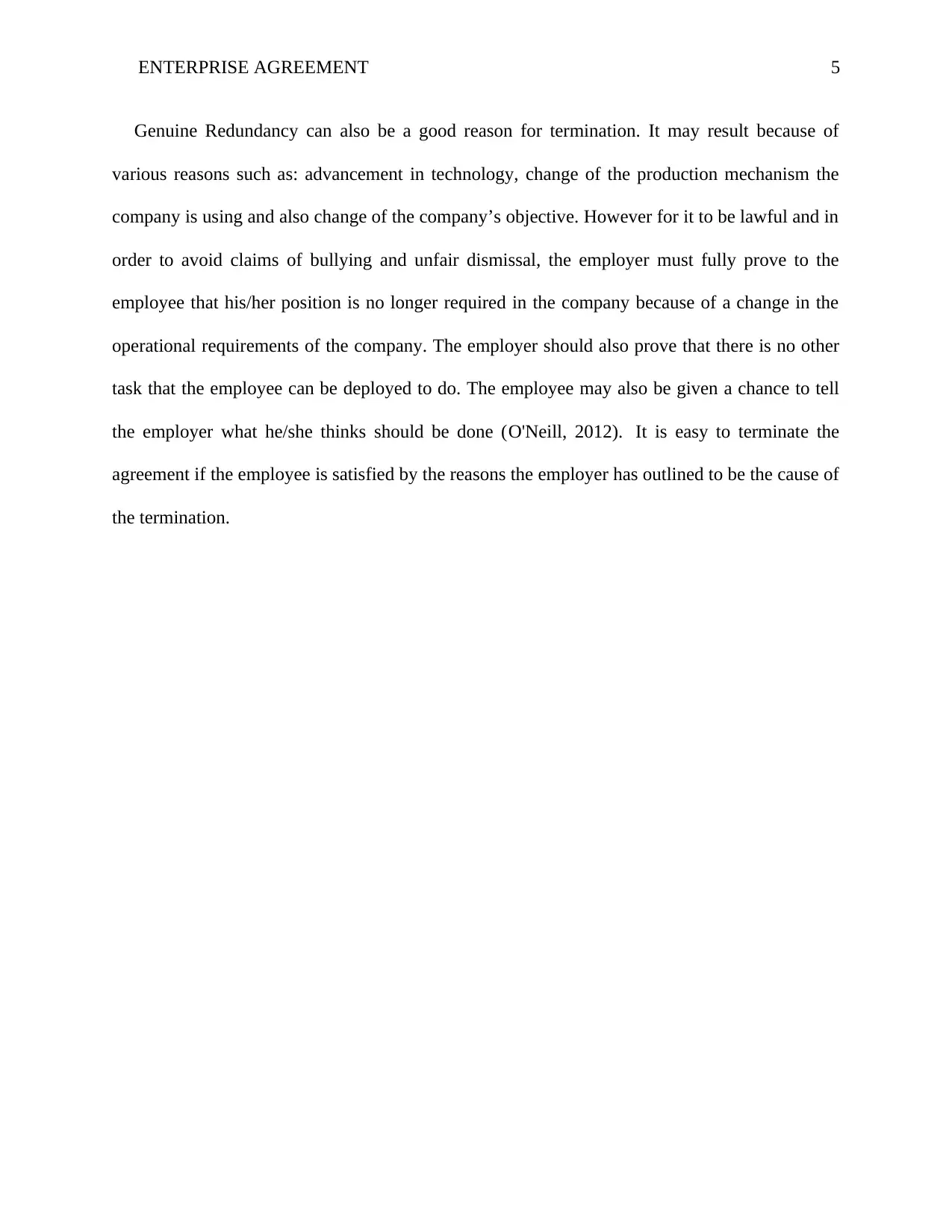
ENTERPRISE AGREEMENT 5
Genuine Redundancy can also be a good reason for termination. It may result because of
various reasons such as: advancement in technology, change of the production mechanism the
company is using and also change of the company’s objective. However for it to be lawful and in
order to avoid claims of bullying and unfair dismissal, the employer must fully prove to the
employee that his/her position is no longer required in the company because of a change in the
operational requirements of the company. The employer should also prove that there is no other
task that the employee can be deployed to do. The employee may also be given a chance to tell
the employer what he/she thinks should be done (O'Neill, 2012). It is easy to terminate the
agreement if the employee is satisfied by the reasons the employer has outlined to be the cause of
the termination.
Genuine Redundancy can also be a good reason for termination. It may result because of
various reasons such as: advancement in technology, change of the production mechanism the
company is using and also change of the company’s objective. However for it to be lawful and in
order to avoid claims of bullying and unfair dismissal, the employer must fully prove to the
employee that his/her position is no longer required in the company because of a change in the
operational requirements of the company. The employer should also prove that there is no other
task that the employee can be deployed to do. The employee may also be given a chance to tell
the employer what he/she thinks should be done (O'Neill, 2012). It is easy to terminate the
agreement if the employee is satisfied by the reasons the employer has outlined to be the cause of
the termination.
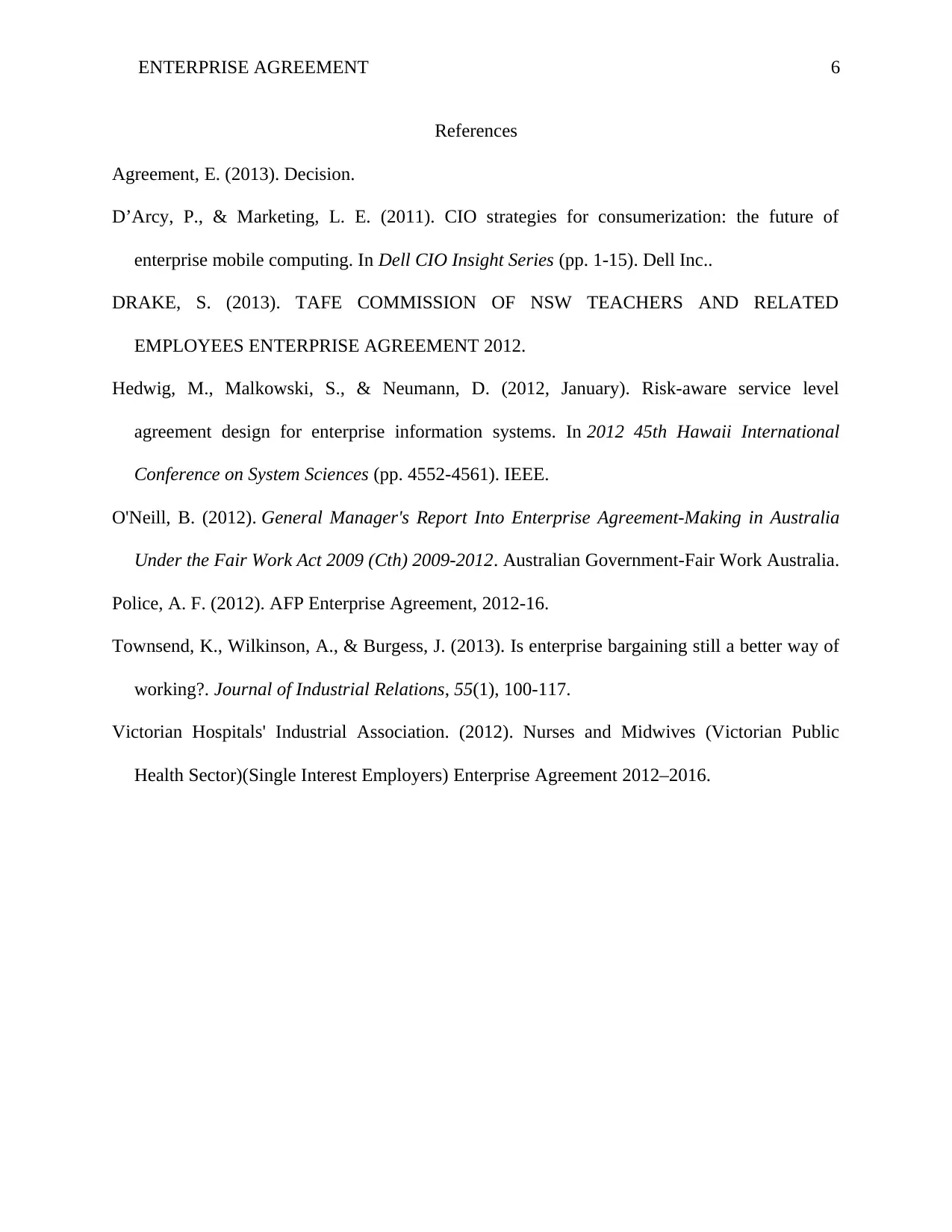
ENTERPRISE AGREEMENT 6
References
Agreement, E. (2013). Decision.
D’Arcy, P., & Marketing, L. E. (2011). CIO strategies for consumerization: the future of
enterprise mobile computing. In Dell CIO Insight Series (pp. 1-15). Dell Inc..
DRAKE, S. (2013). TAFE COMMISSION OF NSW TEACHERS AND RELATED
EMPLOYEES ENTERPRISE AGREEMENT 2012.
Hedwig, M., Malkowski, S., & Neumann, D. (2012, January). Risk-aware service level
agreement design for enterprise information systems. In 2012 45th Hawaii International
Conference on System Sciences (pp. 4552-4561). IEEE.
O'Neill, B. (2012). General Manager's Report Into Enterprise Agreement-Making in Australia
Under the Fair Work Act 2009 (Cth) 2009-2012. Australian Government-Fair Work Australia.
Police, A. F. (2012). AFP Enterprise Agreement, 2012-16.
Townsend, K., Wilkinson, A., & Burgess, J. (2013). Is enterprise bargaining still a better way of
working?. Journal of Industrial Relations, 55(1), 100-117.
Victorian Hospitals' Industrial Association. (2012). Nurses and Midwives (Victorian Public
Health Sector)(Single Interest Employers) Enterprise Agreement 2012–2016.
References
Agreement, E. (2013). Decision.
D’Arcy, P., & Marketing, L. E. (2011). CIO strategies for consumerization: the future of
enterprise mobile computing. In Dell CIO Insight Series (pp. 1-15). Dell Inc..
DRAKE, S. (2013). TAFE COMMISSION OF NSW TEACHERS AND RELATED
EMPLOYEES ENTERPRISE AGREEMENT 2012.
Hedwig, M., Malkowski, S., & Neumann, D. (2012, January). Risk-aware service level
agreement design for enterprise information systems. In 2012 45th Hawaii International
Conference on System Sciences (pp. 4552-4561). IEEE.
O'Neill, B. (2012). General Manager's Report Into Enterprise Agreement-Making in Australia
Under the Fair Work Act 2009 (Cth) 2009-2012. Australian Government-Fair Work Australia.
Police, A. F. (2012). AFP Enterprise Agreement, 2012-16.
Townsend, K., Wilkinson, A., & Burgess, J. (2013). Is enterprise bargaining still a better way of
working?. Journal of Industrial Relations, 55(1), 100-117.
Victorian Hospitals' Industrial Association. (2012). Nurses and Midwives (Victorian Public
Health Sector)(Single Interest Employers) Enterprise Agreement 2012–2016.
⊘ This is a preview!⊘
Do you want full access?
Subscribe today to unlock all pages.

Trusted by 1+ million students worldwide
1 out of 6
Related Documents
Your All-in-One AI-Powered Toolkit for Academic Success.
+13062052269
info@desklib.com
Available 24*7 on WhatsApp / Email
![[object Object]](/_next/static/media/star-bottom.7253800d.svg)
Unlock your academic potential
Copyright © 2020–2026 A2Z Services. All Rights Reserved. Developed and managed by ZUCOL.





